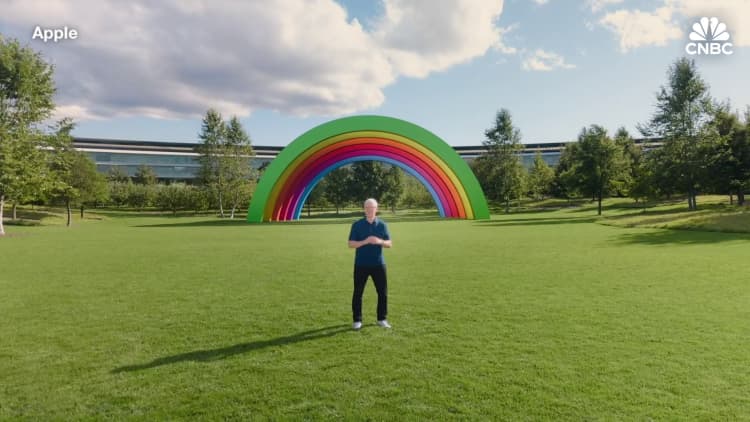Soon, people with AirPods in their ears might not be drowning you — they might be wearing them to hear you better.
Apple announced Monday that the AirPods Pro 2 headphones will become FDA-cleared hearing aids in the coming weeks with a software update. That means adults with mild to moderate hearing loss — about 30 million Americans, according to the Food and Drug Administration — will be able to use Apple headphones to amplify certain sounds they want to hear better.
“After you take a hearing test, your AirPods Pro are turned into a personalized hearing aid, amplifying the specific sounds you need in real time, such as parts of speech or elements in your environment,” Apple’s vice president of health, Sumbul Desai, said in a video introducing the feature.
The announcement is the latest example of Apple’s strategy to break into the healthcare industry, a potential $15 trillion market by 2030, according to RBC Capital Markets. Apple CEO Tim Cook has identified health features as the company’s “most important contribution to humanity.”
That strategy includes developing FDA-cleared features for its functional products, replacing what are often more expensive custom-made medical devices. Since 2020, Apple has added irregular heartbeat notification services, an atrial fibrillation reader, and an ECG reader to its Apple Watch, according to the FDA.
The new feature is a free software update for some AirPods models and will be included with Apple’s $249 AirPods Pro 2.
Many over-the-counter devices are much more expensive, according to a buyer’s guide cited by the Hearing Loss Association of America, an advocacy group. While some OTC hearing aids cost as little as $99, most range from $799 to thousands of dollars.
“What’s really cool about Apple now saying that their AirPods can be over-the-counter hearing aids is that we’re seeing this technological innovation at a price point and in a product that’s very mainstream,” said Barbara Kelley, the company’s chief executive. Hearing Loss Association of America.
Apple is trying to jump-start AirPods sales after a few soft years.
The company doesn’t break out AirPods stats separately, but its Wearables category fell 2% year-over-year in the most recent quarter for which sales are available. Experts say adding health features like hearing aids expands the market for the device, which could help sales.
“The headphones are a very special use case,” said Gene Munster, founder of Deepwater Asset Management, which estimates AirPods account for about 5% of Apple’s total revenue. “It opens it up to a different market.
How it works
Apple’s hearing health experience requires a pair of Apple AirPods Pro headphones and an iPhone.
The company has built hearing tests into its devices in the Settings app. After the program checks that the headphones fit the user’s ears properly, it plays a series of tones over about five minutes. The user has to tap the screen when or if they hear a tone.
This creates profiles of various frequency and volume settings that the user may have difficulty hearing, which are stored in the health app. That profile can be used to turn AirPods Pro into custom hearing aids.
Apple said the test was scientifically valid and based on data it collected from its noise detection apps and a study of 160,000 participants that began in 2019.
In a promotional video, Apple showed a mother putting on AirPods to better hear her son on his birthday.
Over the table
Apple’s promotion has been boosted by a recent regulatory change.
Previously, all hearing aids required a prescription after testing by a licensed audiologist. In 2022, the FDA opened the market to over-the-counter hearing aids that were significantly less expensive through the use of audio testing software or home equipment.
However, Apple’s AirPods won’t immediately make other hearing aids obsolete.
Among its limitations are the six-hour battery life. That’s not enough for the kind of all-day wear that some OTC hearing aids can handle.
Also, AirPods Pro are only for those with mild or moderate hearing loss, meaning people who have trouble communicating in noisy settings. Anyone with “severe” or “profound” hearing loss still needs to see a certified audiologist, experts said.
Apple’s hearing aids were cleared by the FDA on Thursday. The agency said that Apple’s hearing test was evaluated in a study with 118 people in the United States, with “comparable results” and professional adjustment, and was cleared through the De Novo process that regulates medical devices without a clear predecessor on the market.
Bridget Dobyan, chief executive of the Hearing Industry Association, said she welcomed Apple’s entry into the market to raise awareness of hearing health, but there are still many hearing losses that require a medical approach.
“OTC hearing aids may be appropriate for adults with mild to moderate hearing loss, but seeing a certified audiologist can also help determine individual hearing health needs,” Dobyan said.
It’s not uncommon for Apple’s foray into health to draw criticism from executives who say the tech company’s features are no substitute for actual medical devices.
For example, Joe Kiani, CEO of Masimo, a medical device company currently embroiled in an intellectual property and trade-practice lawsuit with Apple, said earlier this year that the Apple Watch’s pulse oximeter feature was “impersonating” a “reliable, medical pulse.” oxygen monitor.”
After a legal victory over the patents, Masimo forced Apple in January to disable the pulse oximeter on newly sold Apple Watch devices.

#Apple #turning #AirPods #hearing #aids #underscores #efforts #tap #large #health #market